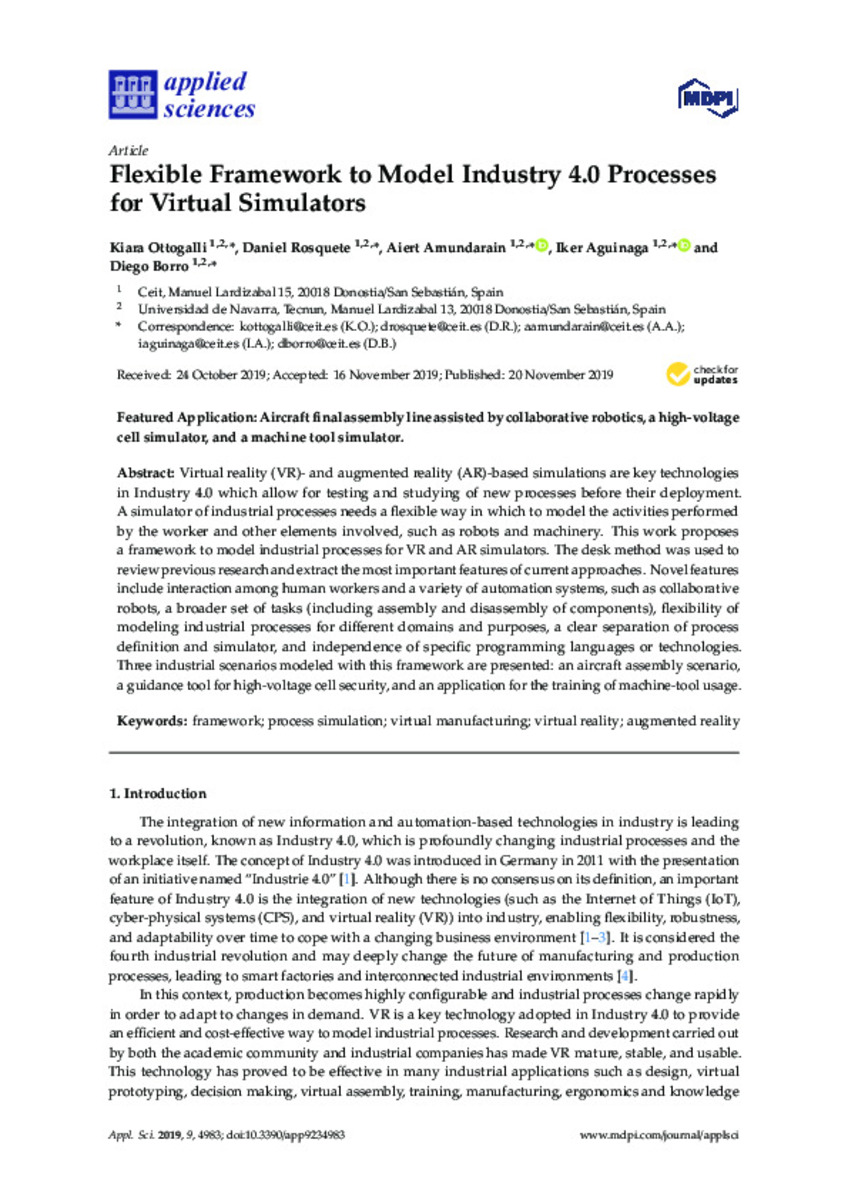Full metadata record
| DC Field | Value | Language |
|---|---|---|
| dc.creator | Ottogalli-Fernández, K.A. (Kiara Alexandra) | - |
| dc.creator | Rosquete, D. (Daniel) | - |
| dc.creator | Amundarain-Irizar, A. (Aiert) | - |
| dc.creator | Aguinaga-Hoyos, I. (Iker) | - |
| dc.creator | Borro-Yagüez, D. (Diego) | - |
| dc.date.accessioned | 2022-01-10T15:04:08Z | - |
| dc.date.available | 2022-01-10T15:04:08Z | - |
| dc.date.issued | 2019 | - |
| dc.identifier.citation | Ottogalli Fernández, K.A. (Kiara Alexandra); Rosquete, D. (Daniel); Amundarain-Irizar, A. (Aiert); et al. "Flexible framework to model industry 4.0 processes for virtual simulators". Applied Sciences. 9 (23), 2019, 4983 | es |
| dc.identifier.issn | 2076-3417 | - |
| dc.identifier.uri | https://hdl.handle.net/10171/62691 | - |
| dc.description.abstract | Virtual reality (VR)- and augmented reality (AR)-based simulations are key technologies in Industry 4.0 which allow for testing and studying of new processes before their deployment. A simulator of industrial processes needs a flexible way in which to model the activities performed by the worker and other elements involved, such as robots and machinery. This work proposes a framework to model industrial processes for VR and AR simulators. The desk method was used to review previous research and extract the most important features of current approaches. Novel features include interaction among human workers and a variety of automation systems, such as collaborative robots, a broader set of tasks (including assembly and disassembly of components), flexibility of modeling industrial processes for different domains and purposes, a clear separation of process definition and simulator, and independence of specific programming languages or technologies. Three industrial scenarios modeled with this framework are presented: an aircraft assembly scenario, a guidance tool for high-voltage cell security, and an application for the training of machine-tool usage. | es_ES |
| dc.description.sponsorship | This research was developed within the following projects: SIMFAL (funded by H2020 Clean Sky 2, grant number 737881), Langileok (funded by the Basque Government, Elkartek program), and VARMAT (funded by Science, Education, and Universities Ministry, RETOS-COLABORACIÓN program). | es_ES |
| dc.language.iso | eng | es_ES |
| dc.publisher | MDPI AG | es_ES |
| dc.relation | info:eu-repo/grantAgreement/EC/H2020/737881/EU | - |
| dc.rights | info:eu-repo/semantics/openAccess | es_ES |
| dc.subject | Framework | es_ES |
| dc.subject | Process simulation | es_ES |
| dc.subject | Virtual manufacturing | es_ES |
| dc.subject | Virtual reality | es_ES |
| dc.subject | Augmented reality | es_ES |
| dc.title | Flexible framework to model industry 4.0 processes for virtual simulators | es_ES |
| dc.type | info:eu-repo/semantics/article | es_ES |
| dc.description.note | This article is an open access article distributed under the terms and conditions of the Creative Commons Attribution (CC BY) license (http://creativecommons.org/licenses/by/4.0/). | es_ES |
| dc.identifier.doi | 10.3390/app9234983 | - |
| dadun.citation.number | 23 | es_ES |
| dadun.citation.publicationName | Applied Sciences | es_ES |
| dadun.citation.startingPage | 4983 | es_ES |
| dadun.citation.volume | 9 | es_ES |
Files in This Item:
Statistics and impact
Items in Dadun are protected by copyright, with all rights reserved, unless otherwise indicated.






